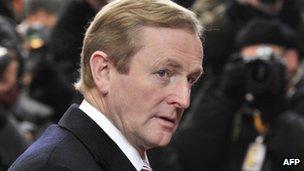Irish to vote on EU fiscal treaty
- Published

Mr Kenny said that ratifying the agreement would be vital for Ireland's economic stability
The Republic of Ireland is to hold a referendum on Europe's new fiscal treaty, the Irish prime minister said.
Enda Kenny said it was in Ireland's national interest that the treaty be approved and he was confident the referendum would be passed.
Last month, Mr Kenny joined 24 other EU states in agreeing the pact for stricter budget discipline.
The government had sought advice from the attorney general as to whether a referendum was necessary.
The cabinet was told on Tuesday that a referendum was required to ratify it.
'National interest'
"I strongly believe that it is very much in Ireland's national interest that this treaty be approved, as doing so will build on the steady progress the country has made in the past year," Mr Kenny told the Dail.
"Ratification of this treaty will be another important step in the rebuilding of both Ireland's economy, and our international reputation.
"It gives the Irish people the opportunity to reaffirm Ireland's commitment to membership of the Euro, which remains a fundamental pillar of our economic and jobs strategy."
Deputy Prime Minister Eamonn Gilmore said the treaty was vital to Ireland's national interests and would bring Ireland beyond "casino capitalism".
Fianna Fail leader Micheal Martin welcomed the decision, he said people need to be engaged.
But But MEP Martin Callanan, chairman of the European Conservatives and Reformists group, said the treaty would not solve the immediate crisis.
"At best it is a distraction from the real economic problems we face.
"The fiscal compact effectively renders socialist high-spending policies illegal. As a fiscal conservative, I should be delighted. However, a nation's economic destiny should be determined by the people through a ballot box, not political elites in a room in Brussels," he said in a statement.
Rescue fund
Asked what David Cameron thought of the Irish plans for a referendum, the UK prime minister's spokesman said it was "a matter for Ireland".
"As I understand it, it is a judgment they have made based on the constitution of that country and their assessment of it, so it is a matter for them."
The spokesman said the referendum decision did not come as a surprise, as it had always been thought possible that Dublin might have to put the fiscal compact to a public vote.
Unlike most other European countries, Irish citizens are entitled to vote on any major transfer of powers to Brussels.
The new pact set to come into effect once it has been ratified by 12 states.
The country's European affairs minister warned last month that it would be hard for the country to remain in the eurozone in the event of a 'No' vote.
Rejecting the treaty would also mean that Dublin would be prevented from accessing the European Stability Mechanism (ESM), the successor to the eurozone's current rescue fund which Ireland is tapping as part of an EU/IMF bailout that runs until the end of 2013.
A poll last month suggested the treaty would narrowly pass with 40% of those questioned saying they would vote 'yes'.
Another 36% opposed the treaty, while a quarter of voters were undecided, Reuters reports.
- Published2 March 2012
- Published22 December 2011